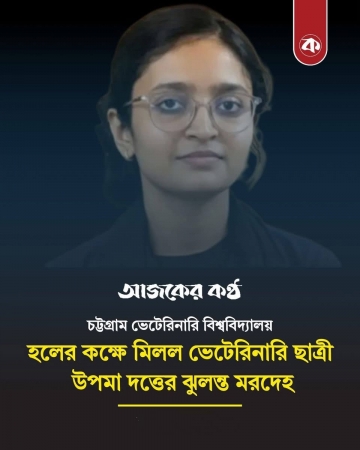

Iraq Rananganeye by Anis Alamgir: An Instant Bengali Classic
by Shibly Azad
(Columbia University, New York)
In spite of prevalent pessimism about Bangladesh, one cannot ignore numerous visible signs of ours becoming global. This sign of growth is particularly extensive, should one takes account of the emergent Bangladeshi media, as the local vernacular press, gradually, is on the process of becoming an industry, exhibiting quantitative and qualitative attributes. Although the Bangladeshi press falls short of Euro-American standard, compared to her neighbors, yet, in many respects of journalism, Bangladeshis can boast about their achievement, as it is fast approaching to world standard. The publication of war reportage, “Iraq Ranangyaney” by Anis Alamgir confirms to the aforementioned statement, as the book is a profile of the recent war in Iraq that has changed the whole political equation of Middle East politics, and Amagir had covered the war, live from battle field.
Alamgir is a veteran journalist, the special correspondent for the Bengali daily, the Ajker Kagoj, and he had covered both the wars in Afghanistan and in Iraq. To be precise, to decorate his hat, Alamgir has multiple feathers: he was captured by the Talebans, while covering the war in Afghanistan, and during the recent Anglo-US invasion of Iraq, as the only representative of printing media from South Asian region, with high visibility, was present in Baghdad. In simple, instead of relying on foreign press, from his hotel room, Alamgir saw the war as a first hand witness, and covered for the Bengali readers. Consequently, his dispatches and the current memoir about the war, becomes unique, since through his eyes, one billion South Asians, particularly the Bangladeshis, witnessed the war in Iraq. This is another reason for uniqueness of his book, as not only in Bengali, but also in any regional languages in South Asia, this is the first kind of such a book, published in the region.
To write his experience, Alamgir combined both objective reporting and personal narratives; thus, making a significant contribution to Bengali literature. Comparable to international standard, regardless of genre, as rarely few books are published in Bengali; our journalistic literature, as a result, until now, was not an exception to that shortcoming, as its repertoire lacked examples of war reportage. Iraq Ranangyaney, in this respect, has filled a void. It is a work of an exceptional quality. And writing this book alone, Alamgir became a pioneer and a trend setter in Bengali journalism. For, publishing the book, he has established a new genre in Bengali literature, as war reporting or first hand eye witness dispatches from war zones did not exist in Bengali earlier. The reason however, was obvious: our media's lacking sound base, in order to become an industry. As a result, similar to Western press, Bengali press could not sustain corps of foreign and/or war correspondents, to cover conflict torn regions. Being the first Bangladeshi to cover two wars and publish a complete book about one, Alamgir thus, became a pioneer and a trend setter, as from now on, whoever would write a similar book, inevitably would be measured against the works of Alamgir.
Because of its content, the book reads like a thriller, as one leafs through the pages. For, the subject itself is thrilling: the Anglo-American invasion of Iraq , to depose the dictator Saddam Hussein. It is his prose style, however, which, in my opinion, what makes Alamgir's book unique. Speaking from personal experience, I hardly have noticed such a lucid prose style as Alamgir's in the Bengali press. Consequently, as one reads the book, one gets the impression of reading war reporting by a veteran Western correspondent, usually from prestigious dailies, New York Times, Los Angeles Times, Washington Post, London Observer, Daily Mirror, or others.
In order to refute any accusation of exaggeration, I can testify to that claim as a regular reader of international pages of prestigious Western dailies, whether of American or European origin, as much as, being an avid reader of such literary output: William Burchett's Inside Vietnam War; Peter Arnett's, Live from Battlefield; Tobias Wolf's, In the Pharaoh's Army; David Remnick's Lenin's Tomb; Chris Bird's, To catch a Tartar and host of others, just to give an idea. Such is the extraordinary quality of the debut attempt that has catapulted Alamgir and the Bangladeshi press instantly, comparable to Western standard.
The initial segment of the book reminds the reader of Deshey Bideshey, as similar to Syed Mujtaba Ali, Alamgir describes his journey to Iraq from his home office in Dhaka, with a description of his preparation at the Ajker Kagoj office; his attempt to convince the Iraqi Ambassador to Bangladesh, to grant him a lengthy visa; his further exploits to dodge fellow journalists, to maintain his lead in the rat race, to reach the war zone, ahead of time. The description is followed by a delineation of hectic harassment that he had encountered at the Dumdum airport at Calcutta, supplemented by additional observations about Indian authorities' filthy attitude towards Bangladeshi air passengers as well as his personal comparison between Arab and Irani etiquette. The section is replete with humorous adventures, with a jocular tone. The book evokes a sense of déjà vu for another reason, as resisting the temptation to render the book in a chaste Bengali, Alamgir employs colloquial vocabularies, as used in Dhaka such as Allah, chapabazi, or faltu, without any cultural and ideological inhibition or linguistic prudery, resulting in developing an instant rapport between writer and his readers.
In addition to a preface, Alamgir includes a chronology of the Iraq War and in context of Saddam Hussein's iron reign that had caused the debacle, an informative section on Iraq that helps readers form a general knowledge about historical roots of the conflict. The main text of the book consists of three segments, which in turn, are subdivided into numerous independent and interconnected chapters, with separate headings and dispatch dates. The first segment delineates Alamgir's preparation at home office, to go to the war zone, prior beginning of the war, as described earlier. The section is followed by a description of pre-war days in Baghdad and its vicinity that offers a rare glimpse of initial indifference of the Iraqi people towards the coming war, as observe Alamgir, life in general went by calmly in the streets of Baghdad. Alamgir argues that because of his perpetual military adventurism, for the Iraqi people, prolonged experience of war became a common phenomenon, resulting in such indifference, among the Iraqi people.
However, as time passes by and Alamgir himself registers with the information ministry, the apparent calmness began to change dramatically, as he could not but notice sense of widespread agitation: people began to buy and store extra amount of food, water, medicine, and durable goods: torch, batteries, and other electrical and electronic stuffs, to sustain for months; the Iraqi Army also began to initiate mass mobilization, dividing the city into military zones, placing armed vehicles at critical points, placing anti-aircraft guns, creating secured positions, and so forth, to encounter a full-scale war; public demonstration against the war took place in streets, regularly; evacuation of diplomatic corps went in full swing, including Bangladeshis. Compounded with these signs and sounds of Iraqi Army's mobilization, it is however, the rising tension among present foreign journalist in Baghdad and the sudden hush prevalent among them, which gave the sign of uneasiness, a feeling of dwindling catastrophe. In the meantime, Alamgir however, made sure to make visits, to observe civic life as well as tourist destinations: Garden of Babylon and the Mazar of the great saint, Hazrat Abdul Qadir Gilani.
In a sense, the war began on 18 March 2003, as Washington gave a forty eight hours ultimatum to Saddam Hussein to leave Iraq, as a means to avoid war. Since Saddam Hussein refused to leave the country, from 20 March on, the ultimatum was followed, as one expected, by incessant attacks, inflicting assaults on every front. Days and nights, Baghdad literary was shocked and awed, as thousands of ballistic missiles and cluster bombs were dropped on the city. A dreadful experience for anyone, as incessant siren kept calling on, interrupted by sounds of continuous loud explosions, as edifice after edifice on both sides of Tigris and Euphrates were targeted, in order to be demolished. Initially, it was the supposed palaces of Saddam Hussein, which took the heavy toll of bombing, followed by official buildings of defense, communication, information, telecommunication ministries and other facilities buildings. Bridges connecting the city with suburbia, flyovers at busy crossings were bombed, in order to halt Iraqi troop's mobilization. In sum, it was a complete destruction of civic facilities, as the neo-Genghis Khans of Washington and London had embarked upon transforming the city into concrete rubbish.
Communication of all sorts, whether telephone or internet, were curtailed immediately, both by Iraqi and US forces. Yet, the real job for the war reporters such as Alamgir had only began, as he had to swerve through chaos, in order to collect information and dispatch them back home. His ordeal was further aggravated as neither could he access regular internet sites nor had any satellite phone, similar to Western journalists, to send report instantly, back home. Alamgir however, could not be demurred. He performed his task expectantly: attending ministry of information's press briefing; taking physical tours to hospitals and civic sites, to assess damages, done by the invading forces that he reported to BBC, German Radio Bengali services, and Channel I regularly, as well as, writing for the daily Ajker Kagoj. It is unprecedented extent of savagery and destruction what readers come to know through pen of Alamgir. Hospital beds are full of blood stained civilians, waiting to be operated for amputation, without any or minimal amount of anesthesia. We read about piles of rubbles, rising high on spots, bombed recently; streets strewn with litters, as well as sense of complete dejection, while the rest of the world held their breath, to witness the thrilling moment: the fall of Baghdad.
The concluding segment offers a vivid picture of now infamous incident: sacking of the city, as literary, similar to previous times, Baghdad was looted. Actually, it was the general scene of the metropolis, following the major battle, what had prevailed in the city, immediately after the fall of Saddam Hussein. While the self-proclaimed liberating forces stood by idly, loot took place under the nose of everyone, as if, as the readers doubt, to encourage the loot, the Anglo-US troops turned a blind eye. Anything and everything, whatever were found was looted, writes Alamgir: National Museum, National Library, National Archives, as well as, diplomatic premises, including the Embassy of Bangladesh. The segment concludes with vivid pictures of engulfing anarchy, as power vacuum what had caused absence of law and order, resulting in chaos, displeasure, and dejection. Frustration and adventurism found its expression in formation of numerous power brokers, although the majority of the population, the Shiites, contrary to Washington's expectation, did not welcome the self-proclaimed liberating forces. The hush that prevailed immediate after the war, in reality, gave adequate indication of coming state of anarchy in Iraq, which as we now observe, has only been materialized.
In addition to his eloquent prose style and thrilling content, the book contains a good number of softer or side stories that helps readers to enjoy lighter side of the event. Alamgir's encounter with and acute observation about persona of numerous foreign journalists, peace activists, and Iraqi officials as well as civilians offer readers enough time to pause for relaxation. His description of Iraqi information minister Sayeed Al Sahaaf, in essence, provides a comic relief, a much as, his encounter with a local Bangladeshi family, who had decided to stay behind gives us a sense of belonging, as the family, in spite of the war, literary took Alamgir under their wings, inviting him to attend a family feast, the long held tradition of expatriate Bangladeshis. The color pictures in the book speak for itself, as in addition to some historic moment and personalities of the event, it explains horrors of war graphically. Above all, the impeccable quality of the publication, printed on quality papers, a rarity in Bengali publishing industry, makes the book a must for collection. Alamgir deserves a hearty congratulation for the effort and we expect that in future, he would offer us similar books, particularly, his Afghan War experience.
Iraq Rananganey
Anis Alamgir
Kagoj Prakashon
First Published, Ekushey Boi-mela 2004
Page 317
Price Tk. 330;US $15
সর্বশেষ এডিট : ১৭ ই ফেব্রুয়ারি, ২০১০ রাত ৯:২২


 অনুগ্রহ করে অপেক্ষা করুন। ছবি আটো ইন্সার্ট হবে।
অনুগ্রহ করে অপেক্ষা করুন। ছবি আটো ইন্সার্ট হবে।








